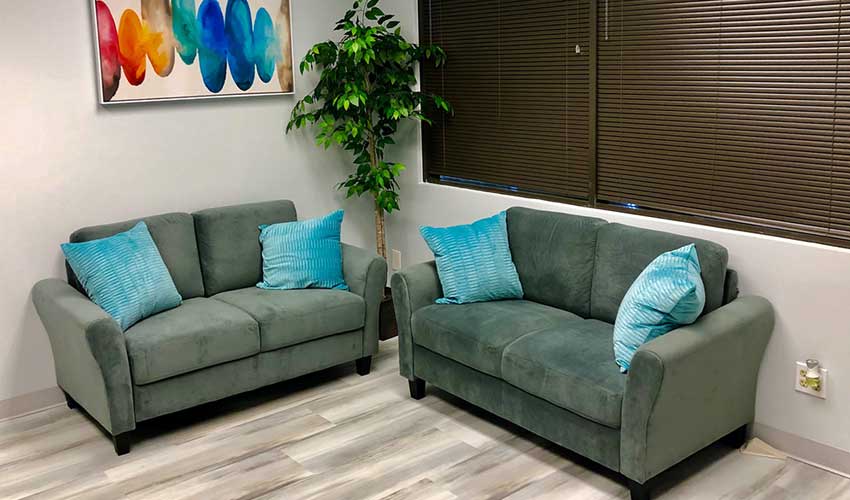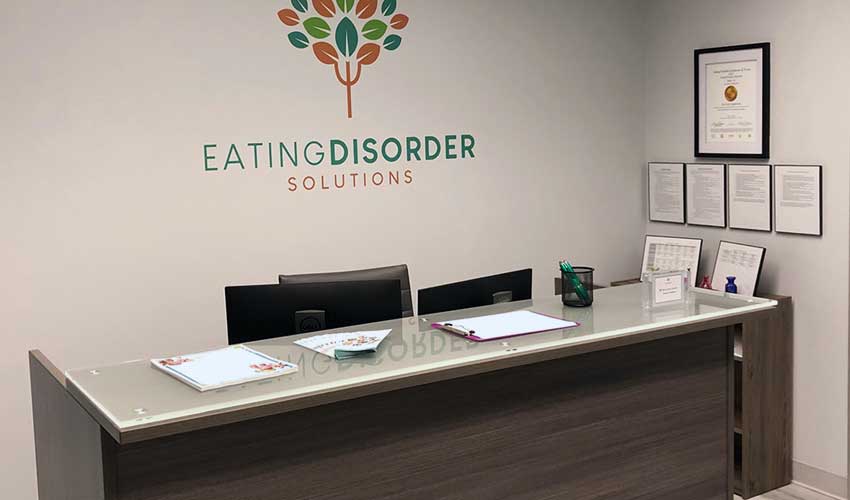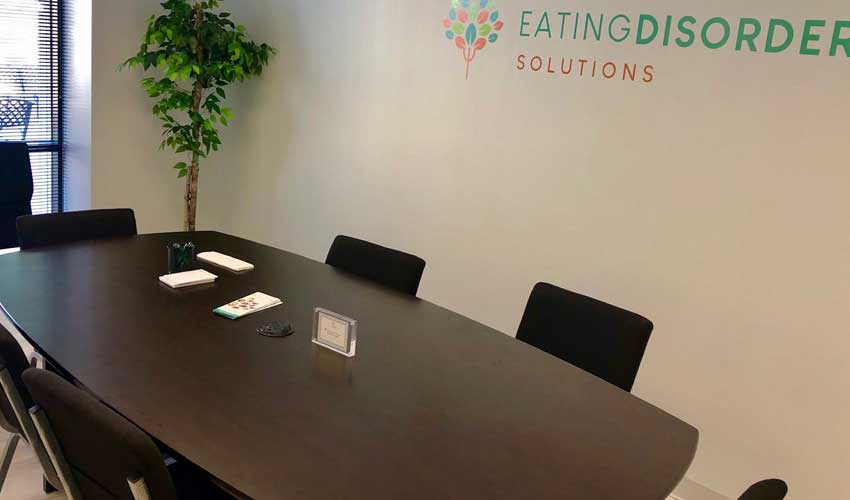Our Intensive Outpatient Program (IOP) allows clients to tend to daily responsibilities such as school or work while receiving the care they need for recovery. We offer both in-person and virtual IOP for your convenience. Clinically supervised by eating disorder professionals, IOP offers individual therapy, nutritional support and the opportunity to address common obstacles and share challenges with peers in group settings. We meet clients where they are to treat the whole person and get to the root of the eating disorder and any underlying conditions including trauma, anxiety, and depression. We also work closely with families, partners and close friends to help them understand eating disorders and learn how to best support their loved one in recovery.
To learn more about our eating disorder IOP, contact us online or call 855-808-4213.

Get Help Now
Eating disorders are treatable. Call us now to begin your journey to a happier, healthier you!
855-808-4213
Request a Call
Request a free consultation from an Eating Disorder Coordinator.
How IOP Eating Disorder Treatment Fits Into Recovery

At our holistic eating disorder treatment center, our mission is to create a comfortable and safe environment in order to provide effective care that focuses on clients’ individual needs. Because of that, our intensive outpatient eating disorder treatment program is a little different for each individual.
In general, our intensive outpatient program for eating disorders provides a structured program of three hours of treatment three days per week. Our intensive outpatient eating disorder program is designed to give individuals aged 18 and older continued care after they complete our residential treatment program.
The overall goal is to help clients adjust to living without eating disorders beyond the safety of our walls. Our program gives them a chance to apply their coping and life skills in real-life situations with continued guidance from our team of specialists. When they’re faced with stressors and triggers upon returning home, they don’t have to feel alone. Our IOP eating disorder treatment allows us to keep supporting them throughout every stage of recovery.
What to Expect During Our IOP
At Eating Disorder Solutions, our team of doctors, registered dietitians, psychologists and therapists understand the complexity of eating disorders. These conditions are deeply rooted in medical and mental health conditions that require customized holistic treatment.
During IOP, you’ll start to experience more flexibility. Our intensive outpatient program for eating disorders allows individuals to work or attend school on evenings and weekends, regaining their independence slowly but surely. The goal of IOP is to allow individuals to shift the majority of their time back to their life outside treatment.
Everyone faces different challenges upon returning home after residential care. For that reason, some individuals may only require three weeks of holistic IOP eating disorder treatment, while others may need two months. We individualize treatments according to each client’s needs and continue to provide support for as long as it is required.
Request a Call
A Typical Week in Our Intensive Outpatient Program
When individuals enroll in our IOP eating disorder treatment program, our team works with them to create a schedule that doesn’t interfere with their schooling or work. We offer three hours of treatment three days per week so your continued care can easily fit into most schedules. This includes one group supported meal and two group therapy sessions to keep you on the right track.
A typical week in our intensive outpatient eating disorder program involves three days of treatment and three hours of therapy each day. Here is what a typical treatment day looks like:
- 11:45 A.M.: Check-In and Vitals Check
- 12:00 P.M.: Meal with Group Support
- 1:00 P.M.: Processing Group
- 2:00 P.M.: Group Therapy (topics may vary)

Therapy in Our IOP Eating Disorder Program

During our intensive outpatient eating disorder treatment program, the main focus is group therapy. As the above schedule shows, each outpatient therapy session takes about one hour. However, this isn’t a strict time limit. Those who need more time discussing a certain topic can certainly get extra guidance.
Our therapists use a variety of counseling techniques throughout IOP eating disorder treatment. Cognitive behavioral therapy (CBT) is one of the most effective. The goal during these sessions is for individuals to learn skills that help them change negative emotions and thoughts about themselves or situations. In doing so, they develop positive behaviors, such as eating a healthy, balanced diet.
Dialectical behavior therapy (DBT) helps clients improve relationships, live in the moment, deal with stress and regulate emotions. These sessions often involve role playing to hone their coping and life skills. We may also assign homework or activities to complete.
While the second session of a day in IOP eating disorder treatment is a therapist-led process group, the other two session topics vary. Some of the topics that we cover include CBT skills, DBT skills, art therapy and nutrition education. We also use group sessions to plan weekly goals and meals and to prep for the weekend ahead.
A Personalized Approach to Therapy
Although our IOP eating disorder program focuses on group therapy, we offer individual and family therapy too. Since Eating Disorder Solutions doesn’t believe in a one-size-fits-all approach to eating disorder recovery, we offer as many resources and as much support as possible to individuals who need it. Our therapists may use CBT and DBT techniques during individual and family counseling sessions.
The goal in individual outpatient eating disorder therapy is to address the specific challenges that a client faces so that he or she can achieve personal goals. During family counseling, we aim to help family members and close friends understand eating disorders. While addressing lingering conflicts to repair relationships, our therapists teach families and friends how to support individuals throughout recovery. Upon request, our registered dietitians can provide meal education as well.

Our IOP eating disorder program provides ongoing nutritional support as individuals acclimate to planning meals on their own. Our registered dietitians strive to teach individuals the basics of intuitive eating and how to have a healthy relationship with food. In the end, the most important aspect is that they reconnect their minds and bodies and learn to enjoy eating again.
In addition to these components of our intensive outpatient eating disorder program, we conduct medical tests when individuals step down from our residential or partial hospitalization treatment programs. The purpose of these medical tests is to ensure that we’re delivering the right level of care for their needs.
Other Levels of Care Offered at Eating Disorder Solutions
As part of our continuum of care, we offer more than just an IOP eating disorder program. We also offer residential, and partial hospitalization (PHP) eating disorder programs. Every program includes counseling, nutrition education with meal planning and medical assessments. However, there are a few differences.
Our facility is one of the few that provides residential eating disorder treatment for individuals aged 18 and older. We understand the psychological and physical issues that require 24-hour care. As our highest level of care, this program consists of long-term, on-site treatment. Like our other programs, the length of time that individuals remain at our facility varies based on their needs. Each day is filled with eight to ten hours of individual and group therapy. On Saturdays, we allow those who engage in the recovery process to go on group trips outside of the facility. Our residential program includes family therapy and periods for visitation as well.
Like our IOP eating disorder program, our PHP intended for individuals aged 18 and older. However, these programs differ in the amount of time spent in counseling at our facility. For PHP eating disorder treatment, clients visit us on five or six days per week for five hours of counseling each day. For OP treatment, they visit us on one or two days for one therapy session each day.
Since there is no one-size fits all eating disorder program, the time an individual may spend in a program will vary. Furthermore, while some individuals may be admitted at our partial hospitalization program, others may start at our intensive outpatient program. Our experienced team can make recommendations based on the severity of the individual’s eating disorder.
Why Choose Eating Disorder Solutions for Intensive Outpatient Eating Disorder Treatment
Eating Disorder Solutions is different than other eating disorder treatment facilities because of our integrated treatment, individualized care, and comprehensive nutritional support. Our treatment programs address the underlying causes of eating disorders while treating the physical symptoms, so clients have a new, healthier relationship with food. We tailor our eating disorder intensive outpatient program to every client, so they can receive the best care for their needs. Our goal is to help our clients break free from their struggles with eating disorders to lead to a happier, healthier lifestyle.
Enroll in Our Intensive Outpatient (IOP) Eating Disorder Treatment Program Today
If you or someone you love is struggling with an eating disorder, treatment is essential. As behavioral health conditions, eating disorders can lead to serious physical health complications. Our intensive outpatient eating disorder treatment program helps individuals foster a positive transition into activities of daily living after our residential or partial hospitalization programs. IOP can also be leveraged as a direct-admit level of care, ideal for clients requiring a higher level of care from an outpatient setting.
Don’t hesitate to get eating disorder treatment any longer. Enroll in a continuum of care that includes ongoing guidance and support with an IOP eating disorder program. Contact Eating Disorder Solutions to take the first step toward long-term recovery.

